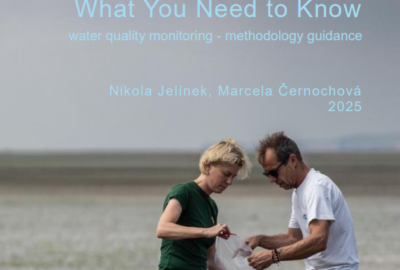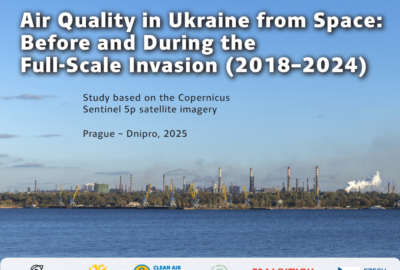In the Dnipropetrovsk region there operate the largest enterprises in Europe producing manganese concentrate and agglomerate for ferroalloy and metallurgical plants (Nikopol Ferroalloy Plant) as well as Pokrovsky and Marganetsky mining plants. The distance between them is: 30 kilometres, the city of Nikopol and almost 120,000 of its citizens who have to inhale industrial emissions. With the support of Czech non-governmental organization Arnika and International Ecological Safety, the project “Nikopol CLEAN Air Monitor – air monitoring project” is realised, within which the activists install public monitoring stations to control the level of air pollution online. How did the activists get this idea and why is it important for the citizens?
Bad heritage
From the Soviet era, the city inherited two large metallurgical plants – the Nikopol Ferroalloy Plant and the South Pipe Plant (Yuzhnotrubnyy zavod). The Nikopol Ferroalloy Plant is still working, and the giant South Pipe Plant has split into a dozen plants with a lower capacity, e.g. Niko Tube, Centravis, Oscar, Trubostal, etc.
And in the immediate vicinity of Nikopol, at a distance of only 11 km, there is the Zaporizhzhya Nuclear Power Plant, the largest in Europe. All this industry has a direct impact on the air quality and health of Nikopol residents.
Eco-digital Nikopol
In July 2019, as a part of an urban festival “Maysternya mista. Nikopol”, an eco-panel “Problems of the environmental pollution of the Nikopol region” took place. During that, for the very first time, the activists presented the possibilities of a grant competition organized by the Czech NGO Arnika, dedicated to solving the problems of industrial air pollution. At this event, Alexander Karpenko, head of the Smart Environment department of the Kyiv Smart City initiative, presented a station for measuring air pollution levels and realized several hours long demonstrative tests of measurements of the main pollutants. The activist was also talking about the excessiveness of the air pollution, which once again showed how the air monitoring system is important for an industrial city. In January 2020, with the participation of an expert – Maksym Soroka, scientific and technical consultant of the Clean Air for Ukraine project – the activists organized a hackathon for creating a geoportal for Nikopol, including creation of a separate air monitoring map on the city.
Ecological monitoring
Since 2018, thanks to the regional environmental programme of Dnipropetrovsk Regional Council, in Nikopol there are two air monitoring stations from the “Center for Environmental Monitoring”. In December 2019, activist Yuri Babinin installed the first public monitoring station of the Eco City project. According to the team, at the moment there is a problem of a lack of a systematic approach to the implementation of environmental monitoring of air quality, effective and user-friendly interaction of monitoring equipment, as well as data verification. Therefore, the Nikopol CLEAN Air Monitor – air monitoring project aims to create complete and integrated network to inform city’s residents and visitors about the quality of the air.
Our goal is to create a monitoring system and have an impact on the air quality
“Our task is to unite different monitoring systems (there are already 3 of them in Nikopol) in a single network, to develop a network of monitoring stations in Nikopol, to engage the citizens through some information campaigns and workshops, to expand the geography of the stations (including the cities of Pokrov, Marganets, Energodar) with the goal of creating a system for monitoring and regular analysis of the air conditions. As a result, we want to get a modern hybrid system for air quality monitoring, based on the principles of qualitative analytics, acceptable threshold data error and real-time measurements,” said Alina Mashenko, coordinator of the Nikopol CLEAN Air Monitor – air monitoring project.
“We hope that this will help us establish cooperation with the city administration and polluting enterprises. Only by cooperation we will be able to achieve continuous online monitoring of the enterprises’ emissions, followed by reducing it by modernization of the filtration equipment and ecologization of the production. We really hope that cooperation with the Czech partners from Arnika will help us not only expand the existing network of public monitoring stations, but also attract expert support to analyze and process the obtained data, to compile and disseminate relevant operational recommendations for the citizens,” Mashenko added.







